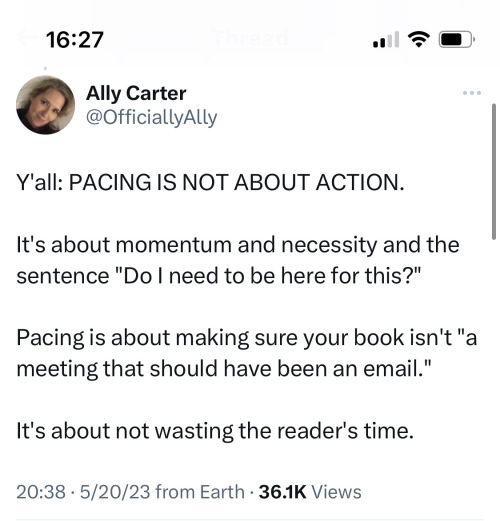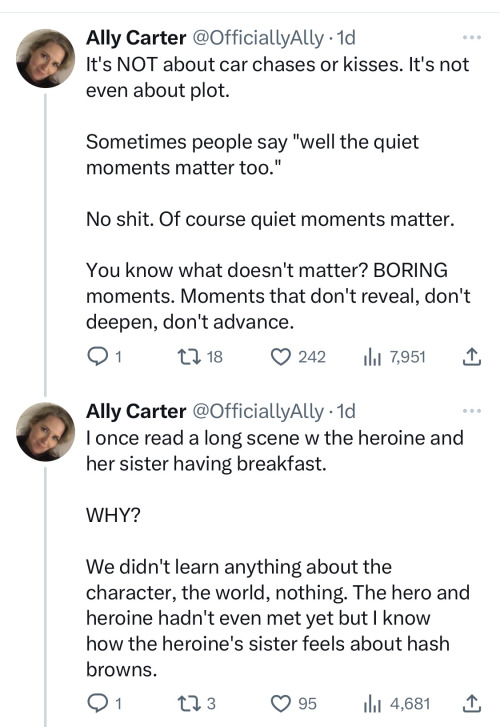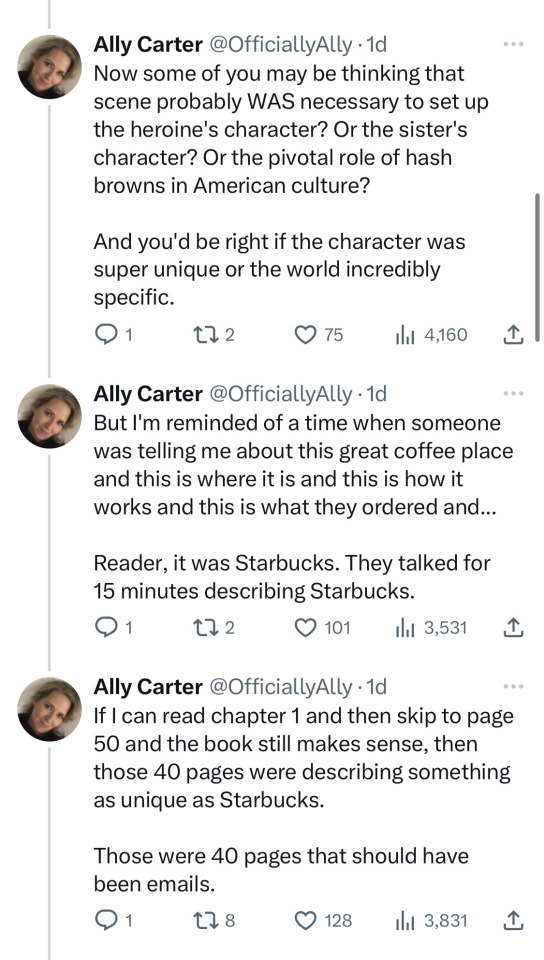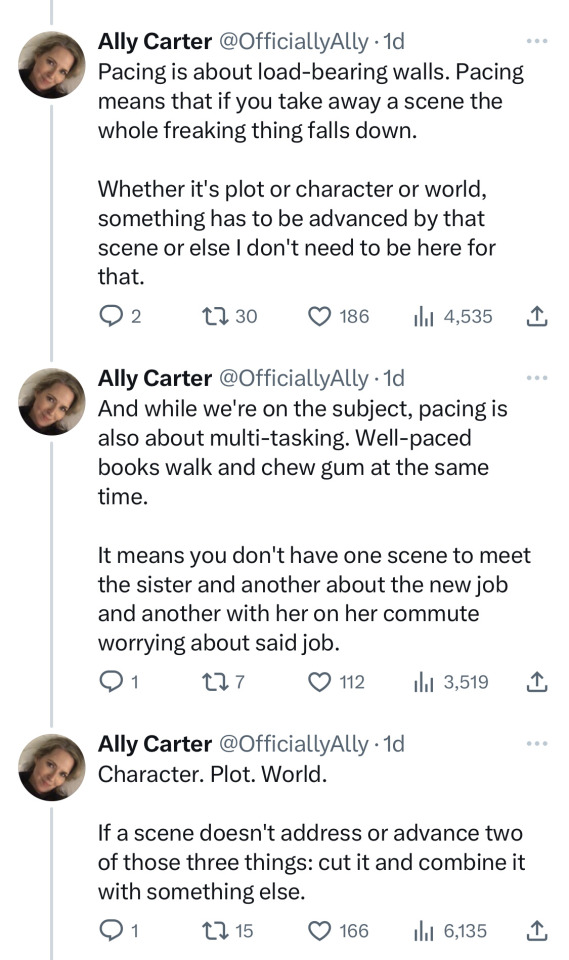WEBSITES FOR WRITERS {masterpost}
WEBSITES FOR WRITERS {masterpost}
E.A. Deverell - FREE worksheets (characters, world building, narrator, etc.) and paid courses;
Rach Academia - FREEBIES (workbook, notion template, games, challenges, etc.);
Hiveword - Helps to research any topic to write about (has other resources, too);
BetaBooks - Share your draft with your beta reader (can be more than one), and see where they stopped reading, their comments, etc.;
Charlotte Dillon - Research links;
Writing realistic injuries - The title is pretty self-explanatory: while writing about an injury, take a look at this useful website;
One Stop for Writers - You guys... this website has literally everything we need: a) Description thesaurus collection, b) Character builder, c) Story maps, d) Scene maps & timelines, e) World building surveys, f) Worksheets, f) Tutorials, and much more! Although it has a paid plan ($90/year | $50/6 months | $9/month), you can still get a 2-week FREE trial;
One Stop for Writers Roadmap - It has many tips for you, divided into three different topics: a) How to plan a story, b) How to write a story, c) How to revise a story. The best thing about this? It's FREE!
Story Structure Database - The Story Structure Database is an archive of books and movies, recording all their major plot points;
National Centre for Writing - FREE worksheets and writing courses. Has also paid courses;
Penguin Random House - Has some writing contests and great opportunities;
Crime Reads - Get inspired before writing a crime scene;
The Creative Academy for Writers - "Writers helping writers along every step of the path to publication." It's FREE and has ZOOM writing rooms;
Reedsy - "A trusted place to learn how to successfully publish your book" It has many tips, and tools (generators), contests, prompts lists, etc. FREE;
QueryTracker - Find agents for your books (personally, I've never used this before, but I thought I should feature it here);
Pacemaker - Track your goals (example: Write 50K words - then, everytime you write, you track the number of the words, and it will make a graphic for you with your progress). It's FREE but has a paid plan;
Save the Cat! - The blog of the most known storytelling method. You can find posts, sheets, a software (student discount - 70%), and other things;
I hope this is helpful for you!
Also, don't forget to check my gumroad shop, where you can find plenty of FREEBIES (from notion templates for writers to workbooks and sheets).
-> Check out my freebies
Happy writing! <3
More Posts from Void-writes-stuff and Others
Want simple tips to heavily improve your skills with character voice??
(📝Note: character voice is the way you convey your character's personality though their pov or dialogue when you write. No two characters speak the same📝)
I speak from experience when I say character voice is hard to get right. Characters, like people, have lots of layers that affect the way they see the world around them and how they interact with other characters. That's why character voice is so important in stories, and why if you write it in a compelling and effective way it will hook people into your story. I hope you learn something new in this post!!
When writing character voice, there's a list of things that you should take into account:
Where are they from? Their past and what they've lived plays a huge part in character voice. Maybe your character grew by the ocean, and so they compare things from the present to the beach, the rocks or the sea itself. You will rarely read about a sailor that is an expert in pants and compares scents to flowers. They might, instead, talk about how a house smells like the wet wood of a ship.
Think about how their personality shapes their language. If they are insecure, they might end most of their sentences with "isn't it?" or "right?" and ask a lot of questions, whereas if you have a confident character, you might find them saying things like "we should do this" or "that will be fun" instead.
What their "lense" is. This is more of an ethic aspect of the character. What have they learn it's okay, and what do they find uncomfortable? Would they find it gross if their friend left laundry on the floor?
Give them special traits (both for dialogue and narration). Maybe character A quotes a lot when they narrate and uses long paragraphs, or maybe B speaks about their past a lot and uses popular sayings. Personally, one character of mine has the tendency to repeat himself when he speaks, as in "yeah, yeah, I'll do it" or "no, no, no. Never" because he is really enthusiastic, and it fits really well with his character.
Pay attention to how they would talk about themselves. Maybe your character doesn't like people to know they're sad because it makes them feel vulnerable, so they will just say they feel annoyed or don't want to talk in that moment. This also means that they will not tell the reader something they are not comfortable saying in the first place.
How is their education? Education is also very important in this context. Did they went to university and have a rich vocabulary and structured sentences, or where they rised in a little farm far from town? You can also play with both a bit: maybe your character did go to university, but maybe they also came from a low income family, and characteristic of both things merge when they talk. Example: long, structured, sentences but a simple and sight forward vocabulary.
That's all for now and happy writing!!
Other tips for writers: previous | next
when a powerful figure is reduced to kneeling. when the lord is forced to bow. when the exile stumbles into an unwelcoming bar. when the “beast” is chained by their horns. when a god is dragged behind their enemy’s chariot, a captive and trophy. when the loyal “guard dog” character is muzzled and the silver-tongued thief falls silent in horror.
that’s the shit
it’s about the contrapasso. the reversal of roles and the sudden, plunging terror of being unable to hide.
🌙 childhood best friends prompts
Bandaging scrapes after falling off of a bike. The first time without training wheels.
A broken toy ends up with everyone in tears and a first heart-felt apology.
A birthmark/scar they were embarrassed about until the other said it looked cool.
Sleeping together on the couch after a full day at the pool. They smell like chlorine and sunscreen.
Copying each other’s homework and doing their best not to make it too obvious.
One is upset and says they don’t want to be friends anymore… They didn’t really mean it, but it’s too late to take it back.
A rib-crushing hug before leaving for Summer vacation.
A spot in the neighborhood that only they know about.
Parents start packing extra lunch so they can share with each other at school.
A secret whispered behind a cupped hand, and a pinky promise to never tell.
Decades later, reminiscing and wishing things could go back to being so simple.
⋆˚࿔ excuse prompts 𝜗𝜚˚⋆
¹⁾ “we were so drunk.”
²⁾ “i was trying to protect you!”
³⁾ “i never thought it would go this far.”
⁴⁾ “this wasn’t supposed to happen, i swear.”
⁵⁾ “he swore he wouldn’t tell anyone.”
⁶⁾ “you’re- you’re never around anymore!”
⁷⁾ “if i’d have waited any longer, the outcome would have been so much worse.”
⁸⁾ “you started this shit, i’m only trying to get us out of it!”
⁹⁾ “i… i just wanted the chance to prove myself to you.”
¹⁰⁾ “yeah, ‘cause you’re all such fucking saints.”
¹¹⁾ “i was handling it fine until you got involved!”
¹²⁾ “i wasn’t thinking, that’s the whole point!”
¹³⁾ “you didn’t give me any other choice.”
¹⁴⁾ “i gave you a pass when the roles were reversed, so maybe a little understanding wouldn’t kill you.”
¹⁵⁾ “if this were anyone else, you wouldn’t be riding them half as hard and you know it.”
¹⁶⁾ “you’ve been under so much pressure… i thought i could take a little of it off you by taking care of it.”
¹⁷⁾ “all i did was put my trust in the wrongs person.”
¹⁸⁾ “if you hadn’t chewed me out so damn hard for asking for your help last time, maybe i would’ve felt safe enough to do it again.”
¹⁹⁾ “do you have any idea what it feels like to be lonely in your own house? of course you don’t, because you’re never fucking here!”
²⁰⁾ “i didn’t think you’d care. nothing else ever seems to make you, so why should this!”
“I was already a hedonistic creature, but with you around I can barely tear myself from this bed.”
One of my favorite D&D gags that I ever came up with is part of a oneshot I've run a few times where the party is hired by a young wizard to help clear out a few active security measures in a tower that the wizard inherited from her old teacher.
The first obstacle to be cleared is the re-animated skeletons that the old wizard was using for gardening help. It's a pretty straightforward fight, but during the encounter, players may notice one particular raised bed of herbs that is set back in a corner of the garden by itself.
Upon further investigation, this one raised bed is absolutely shining with magical protections. There are runes carved into the wood of the bed, gemstones inlaid in the top of it, this bed is absolutely protected out the ass... and an arcana check shows that the protections are all pointed inward, attempting to keep what's in there from getting out.
What's growing in that raised bed, you may ask? What is so dangerous that the old wizard felt the need to place all these protections?
Mint.



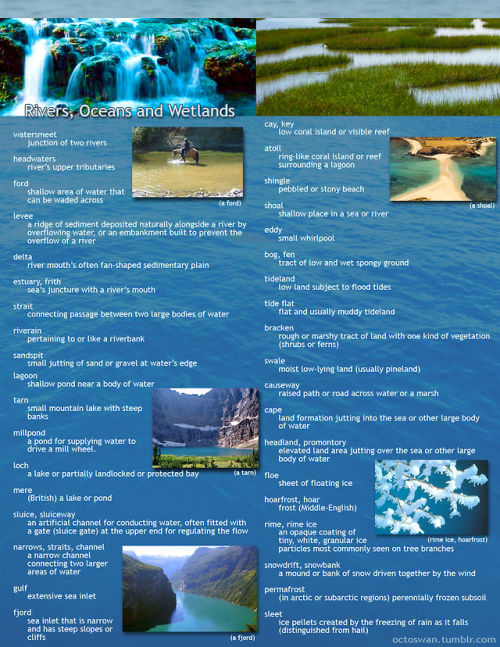
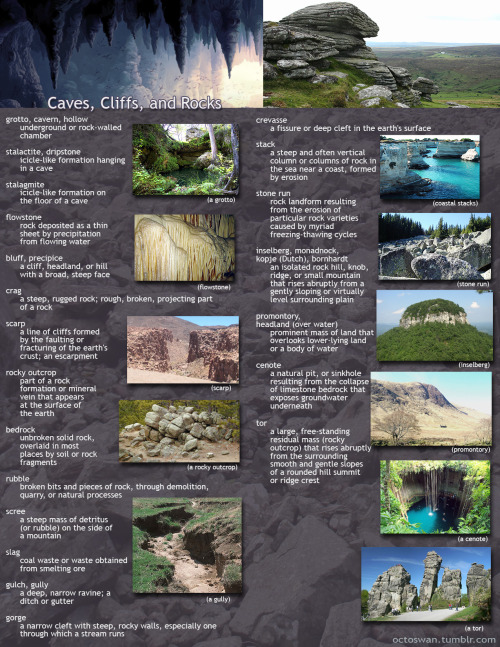
I made these as a way to compile all the geographical vocabulary that I thought was useful and interesting for writers. Some descriptors share categories, and some are simplified, but for the most part everything is in its proper place. Not all the words are as useable as others, and some might take tricky wording to pull off, but I hope these prove useful to all you writers out there!
(save the images to zoom in on the pics)
Some of My Favorite Ways to Describe a Character Who’s Sick
pressing their forehead into something cool or comfortable (this could be an array of things. the table, the floor, someones leather jacket, their water bottle, the countertop)
warm to the touch, or heat radiating from them (could be noticed if someone’s gauging their temperature with their hands, hugging them, or just generally touching them)
leaning into people’s touch, or just spontaneously leaning on them (like pressing into their hand when someone’s checking their temp, or just, like, literally walking up and laying their head on them from fatigue. bonus points if the character is usually feral and the other is scared to engage™︎)
falling asleep all over the place (at the dinner table, on their homework, in the car, in the bathroom — just being so exhausted from doing literally nothing)
being overly emotional (crying over things that don’t usually bother them, like their siblings arguing, or their homework, or literally just nothing)
stumbling/careening/staggering into things (the wall, furniture, other people. there is no coordination in feverish brains. running into chairs, hitting the door, falling over the couch, anything and everything)
slurring their words (could be from fatigue or pain. connecting words that shouldn’t be connected, murdering all of their conversations with the excessive use of ‘mm’ and ‘nn’ in place of words) (this is my favorite thing ever)
being overly touchy (basically like a sick kid — just hold them, please. do that thing where you brush their hair back out of their face, or rub circles on their back, or snuggle them. they won’t care. bonus points if this is also the feral character and they refuse to believe it afterwards)
being extremely resistant to touch (flinching away when they usually don’t so someone can’t feel the fever, not letting themselves be touched because they’re so tired they just know they’ll be putty in their hands if they do)
growing aggressive or being extremely rude (it’s a defense mechanism — they feel vulnerable and are afraid of being manipulated or deceived while they’re ill)
whimpering/whining/groaning (this was in my “characters in pain” post but it’s so good that i’m putting it here too. this shite is gold, especially if it’s just an involuntary reaction to their symptoms)
having nightmares caused by a fever and/or delirium (crying and murmuring in their sleep, or being awake but completely out of it and convinced they’re somewhere else)
making themselves as small as possible (curling up into a ball everywhere they lay, hunching over slightly when standing, wrapping their arms around themselves)
TW for vomiting below cut !!
sleeping in the bathroom floor because they keep getting sick over and over (bonus if someone finds them all weak and pitiful. bonus bonus if they find them there in the morning only to learn they’ve been there all night)
using their hands/other body parts to clamp over their mouth so nothing can come out (like pulling their knees up to their chest and using that, or like, their arm, y’know) (~maccreadysbaby who has emetophobia suddenly gets very awkward about this post~) (~yes i have a phobia of puke and still write this happening to my characters, shut up~) (~it’s about the hurt/comfort okay~)
sympathy pukers (people who aren’t the sick ones but get nauseous/vomit when they see someone else throw up) (~aka me~) (~okay I’m done now~)
dry heaving (it’s gross, but good for making your characters absolutely freaking miserable)
rolling/churning/spinning/cramping/ lurching and all those awesome words that describe what stomachs do when sick (i hate these words with a deep, fiery passion. but they’re good for writing or whatever)
-
 pancakekazoo liked this · 5 days ago
pancakekazoo liked this · 5 days ago -
 mxvladdy liked this · 5 days ago
mxvladdy liked this · 5 days ago -
 unwellfrog liked this · 5 days ago
unwellfrog liked this · 5 days ago -
 void-writes-stuff reblogged this · 5 days ago
void-writes-stuff reblogged this · 5 days ago -
 autistic-web-rat liked this · 6 days ago
autistic-web-rat liked this · 6 days ago -
 babiimoons liked this · 6 days ago
babiimoons liked this · 6 days ago -
 terrific-togekiss reblogged this · 6 days ago
terrific-togekiss reblogged this · 6 days ago -
 terrific-togekiss liked this · 6 days ago
terrific-togekiss liked this · 6 days ago -
 impossibleneckweaselflower liked this · 6 days ago
impossibleneckweaselflower liked this · 6 days ago -
 saphiccarma liked this · 6 days ago
saphiccarma liked this · 6 days ago -
 anexploitableglitch reblogged this · 1 week ago
anexploitableglitch reblogged this · 1 week ago -
 cellsknife liked this · 1 week ago
cellsknife liked this · 1 week ago -
 elegyunderstars liked this · 1 week ago
elegyunderstars liked this · 1 week ago -
 tamber-tales reblogged this · 1 week ago
tamber-tales reblogged this · 1 week ago -
 silverlynxx liked this · 1 week ago
silverlynxx liked this · 1 week ago -
 xx-leech liked this · 1 week ago
xx-leech liked this · 1 week ago -
 smallnugget liked this · 1 week ago
smallnugget liked this · 1 week ago -
 leather-enclosed-moonlight reblogged this · 1 week ago
leather-enclosed-moonlight reblogged this · 1 week ago -
 mr-heebie-jeebies liked this · 1 week ago
mr-heebie-jeebies liked this · 1 week ago -
 fablefrogg liked this · 1 week ago
fablefrogg liked this · 1 week ago -
 yellow-pebble reblogged this · 1 week ago
yellow-pebble reblogged this · 1 week ago -
 yellow-pebble liked this · 1 week ago
yellow-pebble liked this · 1 week ago -
 1122334455pwstvty liked this · 1 week ago
1122334455pwstvty liked this · 1 week ago -
 zj33mcikot4 liked this · 1 week ago
zj33mcikot4 liked this · 1 week ago -
 the-history-of-lesbian-hair liked this · 1 week ago
the-history-of-lesbian-hair liked this · 1 week ago -
 what-are-they-gonna-do-arrest-me reblogged this · 1 week ago
what-are-they-gonna-do-arrest-me reblogged this · 1 week ago -
 dragonwriter142 reblogged this · 1 week ago
dragonwriter142 reblogged this · 1 week ago -
 verbatimz-z liked this · 1 week ago
verbatimz-z liked this · 1 week ago -
 lies418 liked this · 1 week ago
lies418 liked this · 1 week ago -
 crab-withaknife reblogged this · 1 week ago
crab-withaknife reblogged this · 1 week ago -
 crab-withaknife liked this · 1 week ago
crab-withaknife liked this · 1 week ago -
 noiwillnotshutup reblogged this · 1 week ago
noiwillnotshutup reblogged this · 1 week ago -
 alisannagordn liked this · 1 week ago
alisannagordn liked this · 1 week ago -
 cacawphony reblogged this · 1 week ago
cacawphony reblogged this · 1 week ago -
 padfootlet liked this · 1 week ago
padfootlet liked this · 1 week ago -
 ocreatus reblogged this · 1 week ago
ocreatus reblogged this · 1 week ago -
 wickedpyro reblogged this · 1 week ago
wickedpyro reblogged this · 1 week ago -
 wickedpyro liked this · 1 week ago
wickedpyro liked this · 1 week ago -
 vigilante24ish reblogged this · 1 week ago
vigilante24ish reblogged this · 1 week ago -
 vigilante24ish liked this · 1 week ago
vigilante24ish liked this · 1 week ago -
 palidoozy-art liked this · 1 week ago
palidoozy-art liked this · 1 week ago -
 readysetogo liked this · 1 week ago
readysetogo liked this · 1 week ago -
 girldickman reblogged this · 1 week ago
girldickman reblogged this · 1 week ago -
 girldickman liked this · 1 week ago
girldickman liked this · 1 week ago -
 crypticcountryroads reblogged this · 1 week ago
crypticcountryroads reblogged this · 1 week ago -
 crypticcountryroads liked this · 1 week ago
crypticcountryroads liked this · 1 week ago -
 cream-pop liked this · 1 week ago
cream-pop liked this · 1 week ago -
 thebiggestnerd liked this · 2 weeks ago
thebiggestnerd liked this · 2 weeks ago -
 decanoasis reblogged this · 2 weeks ago
decanoasis reblogged this · 2 weeks ago
78 posts
